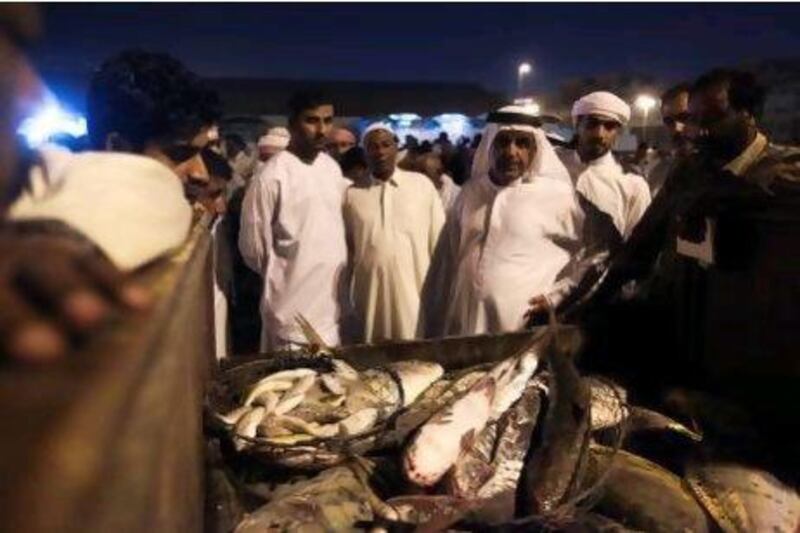DUBAI // It's nearly midnight and most residents are asleep. But for Fareed Abdul Rahman, the work day is just about to begin.
The 21-year-old Emirati is preparing to review hundreds of tonnes of fresh fish of all sizes, shapes and varieties at the Deira fish market.
He is part of an initial group of 20 being trained to work as inspectors at the fish market.
Mr Rahman, an accountancy student at Ajman University, is learning to spot good fish from bad, keep accurate records of catches arriving at the market and regulate prices. He will also stop the sale of undersized fish from the 14 species that Dubai Municipality has deemed illegal.
"I want to get experience," he said. "I want to learn and use my accounting skills."
Last week was Mr Rahman's first day on the site. He already joined other UAE nationals for a two-month, paid training scheme that began last month.
"There are three main reasons for this," said Mohammed Al Marri, chairman of the Dubai Fishermen's Cooperative Association. "We want to regulate sale ... control the quality and quantity of fish, and educate fishermen on how to protect species and the environment."
Municipality officials decided to recruit Emiratis also to raise environmental awareness, after 3,000 tuna carcasses were found in February 18 nautical miles west of Dubai.
The trainees, who were selected after interviews, currently work five-hour shifts at different times of the day. The association plans to sign an agreement with the municipality to introduce at least 40 Emiratis into the market within three years.
UAE nationals will also become heavily involved in a new fish market that is planned for Hamriya.
Mr Al Marri hopes the move can reduce the price of fish, which is sometimes at least 40 per cent overpriced, and reduce the dominance of traders from South Asia.
At the market, Mr Rahman and his cohorts are briefed by the association's manager, Mohammed Saif Al Suwaidi, on what to expect over the next five hours. He tells them to check the fish's eyes, skin colour and hardness, as these are the best indicators of quality.
The trainees wait along with buyers from hotels, supermarkets, companies and traders at the market entrance as the trucks roll in with the first batch of fresh fish.
"We have already started bringing some order in the market," said Mr Al Suwaidi. "Earlier, all the trucks used to come in at the same time. Now, we ensure they take turns."
Once the lorries arrive, the fish is placed in baskets on the floor and the auction begins with the most popular variety: hammour. Prices vary depending on the catch.
"In summer, we can't control the price as the catch is less. But in winter, when the fish quantity is more, we can regulate the price to some extent," Mr Al Suwaidi said.
The association concedes it would be difficult to have an accurate record of the total quantity of fish brought in and sold in the emirate.
"Nearly 400 tonnes of fish comes to the Dubai market every day, of which 60 tonnes are fished locally. It is not easy to control. We are working on a strategy," said Mr Al Marri, the association chairman.
The 400 tonnes is a conservative estimate of the fish that arrives each night at the Deira fish market from around the UAE, other parts of the Arabian Gulf and Asian countries.
Trainees such as Abdulla Al Shehhi, 21, welcome the association's ambitious plans for the fish market.
"I want to help my country. I will do whatever I can," he said.





